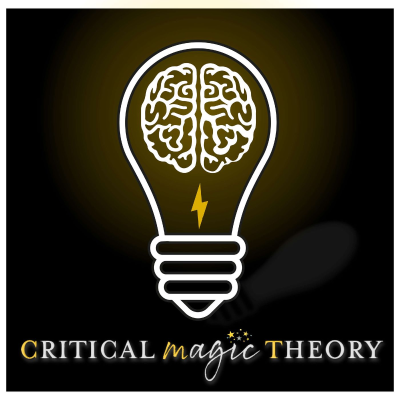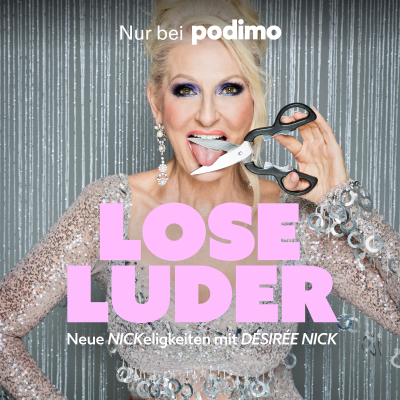
Critical Magic Theory: An Analytical Harry Potter Podcast
Englisch
Gratis en Podimo
Kostenlos hören bei Podimo
Starte jetzt und verbinde dich mit deinen Lieblingspodcaster*innen
- Vertraut von über 1 Mio. deutschen Hörer*innen
- Über 1.000 lokale Podcasts und Shows – nur bei Podimo
- Keine Zahlung nötig
Mehr Critical Magic Theory: An Analytical Harry Potter Podcast
Instead of seeing criticism as an indication of not liking something, Professor Julian Wamble invites listeners of Critical Magic Theory to explore the things about the characters, plot points, and the Wizarding World of Harry Potter broadly that have always given them pause or made them smile without knowing why. It is in this navigation of the positive and the negative aspects of a world that we find true magic.
Alle Folgen
73 FolgenAriana & Aberforth Dumbledore & the Price of Secrecy
In the first episode of Critical Magic Theory in 2026, Professor Julian Wamble steps away from the six-part Albus Dumbledore arc for a rant/rave on Ariana and Aberforth Dumbledore—two characters whose stories expose the wizarding world’s obsession with secrecy. Prof revisits Ariana’s childhood attack by Muggle boys and argues it reveals how ignorance fuels entitlement and violence, while the Ministry of Magic prioritizes concealment over care, pushing families toward isolation instead of healing. The episode then turns to Aberforth: the sibling who stayed, the caretaker who absorbed the fallout, and a cautionary tale of what happens when grief and resentment fester in silence—yet who still chooses to protect Harry and resist Voldemort’s world. Finally, the episode complicates what it means to be a “good” half-blood, showing how the Dumbledores don’t fit neat categories of supremacy or bridge-building when their relationship to Muggles is shaped by trauma, passing, and retreat.
IT IS CHRISTMAS... AT HOGWARTS
MERRY CHRISTMAS TO ALL (WHO CELEBRATE)!! AND TO ALL.... AN INVISIBILITY CLOAK!! USE IT WELL! In this episode of Critical Magic Theory, Prof. looks at the various Christmas moments throughout the series and analyzes them.
Prof Responds: Dumbledore, Necessity, and the Myth of “No Other Choice”
In this Prof Responds episode of Critical Magic Theory, Professor Julian Wamble returns to Harry Potter to engage listeners’ reflections on Albus Dumbledore. Rather than asking whether Voldemort had to be defeated, this episode interrogates how necessity becomes moral justification, why “not a villain” is not the same as “good,” and what responsibility adults bear when children are asked to fight a war they did not choose. Through questions of prophecy, hindsight, and power, Prof Responds examines whether Dumbledore’s choices were truly constrained—or whether “no other choice” narratives obscure avoidable harm and institutional failure. The episode ultimately shifts the focus away from hero-versus-villain debates and toward harm, accountability, and the moral residue left behind in the Harry Potter universe after the war is won.
The Fears, Fallacies, and Folly of A.W.P.B. Dumbledore
In this penultimate episode of our Critical Magic Theory series on Albus Dumbledore, Professor Julian Wamble takes a deep look at one of the most complicated figures in the Harry Potter universe. Is Dumbledore a villain? Was he ever a good mentor to Harry? And, after two Wizarding Wars, was everything he did actually worth the cost? Drawing on listener responses, scholarly insight, and the emotional legacy of the series, we explore why Dumbledore causes so much harm yet remains so difficult to label as a villain. We examine his failures as a mentor, his manipulation of children, and his reliance on secrecy — all while confronting the intergenerational trauma that shapes both Wizarding Wars. And finally, we ask the most challenging question of all: can saving the world justify the sacrifices it demands? Whether you love Albus Dumbledore, distrust him, or don’t know what to make of him, this episode offers a powerful and nuanced analysis of the headmaster who shaped and scarred the Wizarding World.
Prof Responds: If Not Him, Then Who? Dumbledore & the Pitfalls of Wartime Necessity
In this Prof Responds episode of Critical Magic Theory, Professor Julian Wamble takes a critical look at Albus Dumbledore’s most morally complicated choices in the Harry Potter series. Drawing on listener reflections from the Patreon post-episode chat, Prof examines how Dumbledore’s permanent state of war shaped his treatment of Harry, the Order of the Phoenix, and the entire wizarding world — and how the myth of wartime necessity allows us to excuse harm done in the name of the “greater good.” Through connections to real-world wartime politics and parallels to The Hunger Games, this episode explores why Dumbledore fought evil without ever changing the system that produced it, and why loving a character doesn’t mean we can’t tell the truth about their actions. This is a deep, nuanced dive into power, trauma, leadership, and the limits of heroism in the Wizarding World.















































![Kiss me once [Kiss the Bodyguard-Reihe, Band 1 (Ungekürzt)]](https://cdn.podimo.com/images/90dee68e-9f1b-4723-9f8c-92ee2a3c5cf0_400x400.png)